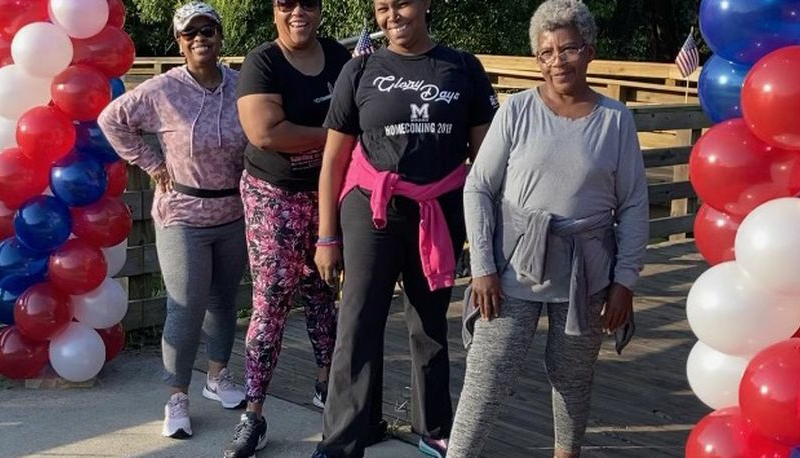By Gracie Bonds Staples, For the AJC
Troy Warren for CNT #Health
To this day, Vershelle Frazier remembers the moment she looked in the mirror and barely recognized herself.
Like the rest of us, COVID-19 had forced her and her husband Arvin to hunker down at home. After nearly a year of isolation, she’d packed on 16 additional pounds.
“I looked in the mirror and said ‘oh my God’,” Frazier recalled recently.
Whether she realized it at that moment or not she was hardly alone.
According to an American Psychological Association Stress in America survey conducted in February, 42 percent of U.S. adults reported gaining weight since the start of the COVID-19 pandemic, with an average gain of 29 pounds.
Not surprising, children put on extra pounds, too, falling victim to the same factors that caused their parents to gain weight — sitting for long periods, poor sleep, and high stress, all of which can increase hunger and cravings for chips and other comfort foods.
But let’s face it, even before the pandemic, the availability of high-calorie foods and beverages made it pretty easy for the average American to gain weight rather than to lose or maintain it.
Now with the holiday season fast approaching, the opportunities for weight gain will be even greater.
Frazier and her friends Joy Rollins, Melodee Hinnant-Thomas and Alice Johnson know from experience.
For years, Thanksgiving day was an invitation to indulge. A pretty table to them was one loaded with all the fat-inducing trimmings: turkey and dressing, mashed potato and mac and cheese, sweet potato pie and pound cake.
But if COVID-19 has taught them one thing, it is this: the energy you consume had better match the energy you expend.
Indeed, energy balance, according to Scott Powers, an exercise physiologist and distinguished scholar in health sciences at Stetson University, may be the secret to maintaining a healthy body weight.

“For most of us, that means having a body mass index below 25,” said Powers. Body mass index, often called BMI, is a standard clinical estimate of body fat based on height and weight and applies to both men and women. The higher your BMI, the higher your risk is for chronic diseases such as heart disease, high blood pressure and type II diabetes.
The body, he said, stores fat energy primarily in white fat cells located under the skin and throughout the abdominal cavity.
“If you consume more energy than you expend, there is an excellent chance that the energy will be stored in the form of triglycerides, which are a kind of fat used to store energy inside fat cells,” Powers said. “And so the reality is that all of us have to be on guard to have an energy balance (i.e., energy in = energy expended) to prevent weight gain.
“How you consume calories — carbohydrates, fats, proteins — may not be as important as consuming excess energy. Total food or energy intake is what people should be concerned with.”
A high fat diet, however, can be a health concern. The problem with consuming a high fat diet is not only does it likely contain twice as many calories as consuming proteins or carbohydrates, it can increase your risk of heart disease, Powers said.
In the absence of disease, he said that everything we do in the course of a day expends calories and so at the end of the day if you add up all the energy you consume and subtract, that energy is going to remain in the body and will likely be stored in the form of fats.
Powers said that while exercise is not necessary to lose weight, there are advantages to including exercise in our lives. For one, regular exercise is the only known health behavior that has been shown to reduce all causes of deaths from chronic diseases. Exercise, for instance, lowers our risk for type 2 diabetes, hypertension and 13 different kinds of cancers.
And by exercising, you increase voluntary energy expenditure and you can consume more food and still have a calorie deficit.
Frazier and her crew made that discovery soon after Hinnant-Thomas encouraged them to join a church sponsored program called the 40-day Turn Up.
Hinnant-Thomas, a 58-year-old Ellenwood mother of two grown children, said that when COVID-19 hit she was midway through the 40-day Turn Up.
In addition to being morbidly obese, she’d been diagnosed with both hypertension and diabetes.
“(The Turn Up) saved my life,” she said. “I’m off both my medications and I’ve lost 56.5 pounds.”
Making sure 90 percent of her food choices are good ones and exercising regularly has been key to losing and keeping the weight off.
She, Frazier and the others aren’t done. During the week, they make sure they do some type of exercise every day. After virtual church on Sundays, they gather on the Atlanta Beltline for a four-mile walk.
And so the Thanksgiving table will look a lot different.
“I’m not going to make all the starches I normally make,” Hinnant-Thomas said. “We’ll have lots of vegetables. Same for Christmas.”
Like Hinnant-Thomas, Frazier has maintained her weight loss. She’s sure the holidays won’t change that.
“Here’s what we know to do,” she said. “Thanksgiving is one day but we give thanks every day, including thanking our body for operating at an optimal level. Now that we’ve lost the weight, we’re eating better, sleeping better and we realize we can’t go without some type of daily exercise.”
For those a little less sure, Powers offered a few tips to avoid packing on the pounds during the holidays and every day of the year.
First and foremost, be aware that everything we eat has to be offset by our total energy expenditure.
Second, be wise in your choice of food. Foods high in protein but low in fat can suppress hunger.
Consume more vegetables.
And third, engage in outdoor walks with guests instead of sitting on the coach. Use it as an opportunity to engage in exercise and have fellowship at the same time.
In Other NEWS



































